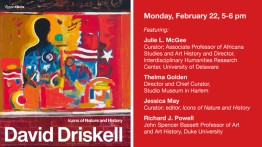David Driskell: Icons of Nature and History
Monday, February 22, 2021, 5 - 6pm

Cover: David Driskell, Ghetto Wall #2 (detail), 1970. Portland Museum of Art, ME. Artwork is © Estate of David C. Driskell, courtesy DC Moore Gallery, New York
Join an online panel of curators and art historians featuring Julie L. McGee, Thelma Golden, and Richard J. Powell with curator and editor Jessica May as moderator as they discuss the legacy of artist, curator, art historian, and educator David Driskell (1931-2020), who was pivotal for bringing awareness to Black artists. The conversation centers on seven decades of Driskell’s painterly practice from the 1950s forward, and is timed to the publication of David Driskell: Icons of Nature and History (Rizzoli Electa in association with Portland Museum of Art, Maine, and the High Museum of Art, Atlanta), and the first posthumous traveling survey of Driskell’s work (currently open at the High before traveling to the Portland Museum of Art, the Phillips Collection, Washington, D.C., and the Cincinnati Museum of Art) that the catalog accompanies.
David Driskell was one of the most revered and boundary-breaking American artists, long recognized for his vibrant and versatile painting and printmaking practice, which combined his sharp observation of American landscapes and his interest in the imagery and aesthetic innovations of the African diaspora. In addition to his work as an artist, he was one of the world’s leading authorities on the history of African American art, known for the landmark 1977 exhibition Two Centuries of Black American Art, which was dedicated to works made exclusively by African American artists in the United States between 1750 and 1950.
Panelists include:
Julie L. McGee is an art historian and the curator of David Driskell: Icons of Nature and History. Her previous scholarship on Driskell includes the monograph David C. Driskell: Artist and Scholar (2006). She co-curated the 2011 exhibition Creative Spirit: The Art of David C. Driskell. McGee is Associate Professor of Africana Studies and Art History and Director of the Interdisciplinary Humanities Research Center at the University of Delaware.
Thelma Golden has been Director and Chief Curator of the Studio Museum in Harlem, the world’s leading institution devoted to visual art by artists of African descent, since 2005. She is an authority in contemporary art by artists of African descent and an active lecturer and panelist speaking about contemporary art and culture at national and international institutions.
Richard J. Powell is the John Spencer Bassett Professor of Art and Art History at Duke University where he teaches courses in American art, the arts of the African Diaspora, and contemporary visual studies. He is the author of Homecoming: The Art and Life of William H. Johnson; Black Art: A Cultural History; Cutting a Figure: Fashioning Black Portraiture; and Going There: Black Visual Satire.
Moderator Jessica May is the co-curator David Driskell: Icons of Nature and History and editor of the accompanying catalog. Most recently she served as Deputy Director and Robert and Elizabeth Nanovic Chief Curator at the Portland Museum of Art, where she presented exhibitions of the art of Richard Estes, Nan Goldin, Tim Rollins and KOS, and Clifford Ross.
Complete Cover Credit:
Cover: David Driskell, Ghetto Wall #2 (detail), 1970. Oil, acrylic, and collage on linen, 60 x 50 in. Portland Museum of Art, Portland, Maine. Museum purchase with support from the Friends of the Collection, including Anonymous (2), Charlton and Eleanor Ames, Eileen Gillespie and Timothy Fahey, Cyrus Hagge, Patricia Hille Dodd Hagge, Alison and Horace Hildreth, Douglas and Sharyn Howell, Harry W. Konkel, Judy and Leonard Lauder, Marian Hoyt Morgan and Christopher Hawley Corbett, Anne and Vince Oliviero, D. Suzi Osher, Christina F. Petra, Karen and Stuart Watson, Michael and Nina Zilkha, and with support of the Freddie and Regina Homburger Endowment for Acquisitions, and the Emily Eaton Moore and Family Fund for the Collection, 2019.16. Artwork is © Estate of David C. Driskell, courtesy DC Moore Gallery, New York




